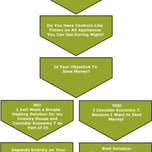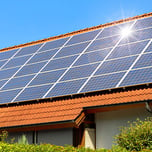
Get up to 4 quotes by filling in only 1 quick form

Slash your energy bills by installing solar panels

We’ve helped over 500,000 homeowners reduce their carbon footprint
- GreenMatch
- Blog
- How Many Solar Panels Do I Need?
How Many Solar Panels Do I Need?
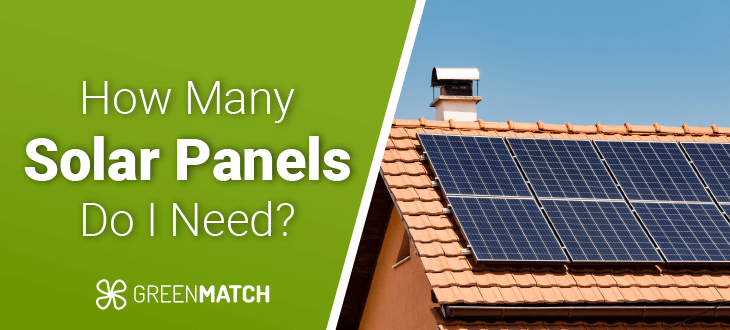
Before installing solar panels for your home, there is one key question you should ask yourself, namely: How many solar panels do I need? To find the answer and get the most benefits of solar energy, you will want to consider your daily energy consumption, the number of sun hours in your area, and the size of your roof.
In this article, you can learn more about how to calculate the number of solar panels you need to power your home. However, you might find that even after learning more about how solar panels work you still need some assistance with determining just how many you need. If that is the case, you will want to consult a solar panel installer.
Finding a reliable installer who can help you can be a daunting task that can lead to hours of research, without a guarantee that you will get any fruitful results. To help you avoid wasting your time, we can put you in touch with solar panels vetted by us in less than 1 minute!
By clicking below, you can fill in our short contact form and request quotes from up to 4 local solar experts. This way, you can find trusted installers who operate in your area, choose the installer you want to work with, and find the best deal for your new solar panel installation. All quotes are completely free and non-binding.
- Quotes from local engineers
- Payment by finance available
- Save up to £729 per year
It only takes 30 seconds



- How Many Solar Panels Do I Need?
- What is the average number of solar panels in a UK home?
- How do I calculate the right solar array size?
- What type of solar panels should I install?
- What is the cost of solar panels?
- Do I need solar battery storage?
- How do I find the right installer?
- Frequently asked questions
What is the average number of solar panels in a UK home?
One of the determining factors in figuring out how many solar panels you need is the number of people in a household. The average 2-3 person household uses approximately 2,900kWh of electricity annually.
The size of your house is also a key factor to consider when calculating how many solar panels you need. You can consult the table below for an idea of the number of solar panels required to power homes of different sizes.
| How many solar panels do I need? (by house size) | |||
|---|---|---|---|
| House size | Solar PV system size | Number of solar panels (250W) | Number of solar panels (400W) |
| Flat or 1-bedroom house | < 2000 kWh | 2 – 4 | 2 – 6 |
| 3-bedroom house | 2000 – 4000kWh | 4 – 6 | 6 – 11 |
| 4 or 5-bedroom house | 4000 – 6000kWh | 7 – 9 | 11 – 16 |
| 5+ bedroom house | 6000 – 8000kWh | 10 – 15 | 16 – 21 |
A 6kW solar panel system with battery in the UK is recommended for a home with over five people, while a 5kW solar system is typical for a home with four people. A 4kW solar system is one of the most common sizes for domestic solar systems, as it suits homes with 3 to 4 people. You can visit our ‘4kw solar system with battery cost in the UK‘ guide to see how much a system like this will cost.
The number of solar panels you need will vary depending on whether your installation is a 3kW or 6kW, and the size of solar panels you will use. For example, if you install a 3kW solar system using 250W panels, then you need 12 solar panels. A 6kW system would need 24 solar panels.
The average number of solar panels will also be determined by whether you would like your solar panels to generate all your electricity needs or only a percentage.
An average UK home consumes between 3kWh and 6kWh of energy daily, and some UK homeowners use solar energy to power only parts of their energy consumption, which would then reduce the number of solar panels installed.
- 6kW → 5+ people
- 5kW → 4 people
- 4kW → 3 – 4 people
- 3kW → 2 people or less
The number of solar panels depends on the system size (3kW or 6kW) and the panel measurement size. Based on a solar array made up of 250W panels, each system requires the following number of panels:
- 6kW → 24 panels
- 5kW → 20 panels
- 4kW → 16 panels
- 3kW → 12 panels
These averages would supply 100% of your electricity. If you’d only require some of your electricity to be supplied using solar panels, then the number of panels you need could be lower.


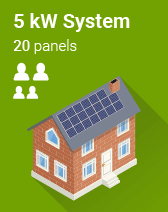
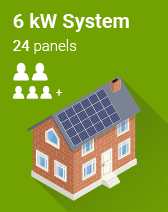
How do I calculate the right solar array size?
To calculate what solar system size you need, you should first know the amount of energy that you need to generate from your solar system daily. The other important things are the sun hours in your area and your roof space, as this can help you determine how many solar panels your roof can accommodate.
Generally in the UK, 12 solar panels are needed for a 3kW solar installation, and 24 panels for a 6kW installation. Overall, the bigger the size of the panel, the more energy is generated per square metre.
The table below shows the approximate amounts of space you need in order to generate a specific amount of energy.
| Size of solar panels | Number of 250W panels | Estimated surface area |
|---|---|---|
| 3kW | 12 | 19.2 m² |
| 4kW | 16 | 25.6 m² |
| 5kW | 20 | 32.0 m² |
| 6kW | 24 | 38.4 m² |
* Table assuming 250Wp Solar Panel dimensions: 1.6 x 1 m = 1.6 m²
To determine how much electricity you need your solar panels generate and find out how many you need to install on your roof, you can check your monthly energy bills. These can provide information on the amount of energy that you consume per day, and therefore how much energy you need your solar panels to generate daily.
For example, if your monthly consumption is 124 kWh in January, then your daily consumption is 4 kWh. This means that the solar system should generate an average of 4 kWh daily. The 4 kWh can also be referred to as the expected daily solar system power output.
You can follow the same process to find the right commercial solar panel system size if you want to invest in solar PV for your business.
Some people may question if the UK is sunny enough for solar panels. The UK has an average of 4 sun hours daily which means you can certainly benefit from having a solar panel system installed.
It is important to be aware that different regions in the UK have different sun hours per day: England has 4.1, Scotland has 3.7, Northern Ireland 3.2 and Wales 3.3. This means that it could be more beneficial to install solar panels in Scotland, compared to solar panels in Northern Ireland. It is therefore important that you consult your local installer for guidance. This could result in bringing down the solar panel price in Wales, England, Scotland or Northern-Ireland.
Determining individual solar panel sizes
To determine the size of the panels that you need for your house, you need to know the following:
- How much energy do solar panels with different capacities generate?
- The capacity of your roof: how much space in square meters is available?
- Dimensions of solar panels per size or brand.
Solar panels generate different amounts of energy depending on their wattage size or rating. A 250 watt panel will generate up to 250 watts per sun hour while a 300 watt solar panel can generate up to 300 watts per sun hour. This is why it is important to know the amount of energy you need before determining solar panel sizes.
In the earlier example with a daily consumption of 4 kWh (4,000 W/hrs), if the homeowner used 250 W solar panels, then they would need to install 16 solar panels (4,000 Wh/250 W). If they used 350 W panels, then they would need 12 solar panels (4,000 Wh/350 W). Most residential solar panels on the market produce between 250 watts and 400 watts per hour.
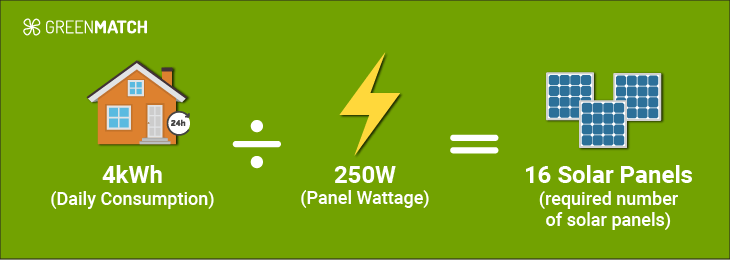
The capacity of your roof impacts the number of solar panels you can install and therefore how much energy you can generate. This is also because different solar panel sizes have different dimensions.
Continuing with the previous example, if you are installing 16 250W solar panels, you would require a surface area of 25.6 m².
If you are installing 12 350W solar panels would require a surface area of 22.8 m².
It is therefore important to know how much space you have. The table below outlines the average solar panel dimensions and weight per system size.
| Solar panel size (W)* | Solar panel dimensions* | Weight per panel |
|---|---|---|
| 250 | 1.6 m x 1 m | 18 kg |
| 300 | 1.67 m x 1 m | 18 kg |
| 350 | 1.9 m x 1 m | 21.6 kg |
*It is important to note that different brands may have different solar panel dimensions.
What type of solar panels should I install?
The choice of solar panel type can be based on efficiency, cost, and available space. Some types of solar panels are more efficient than others, and this would affect the number of panels you need to install.
For example, you need less space to install monocrystalline panels compared to thin film and polycrystalline solar panels.
There are different types of solar panels that can be installed on your roof, but the most commonly installed panels are monocrystalline or polycrystalline solar panels. Although now the solar panel market is being dominated by monocrystalline panels due to their higher efficiency.
- Efficiency rate of 15-20%
- They require the least space for installation
- Less affected by weather compred to other options
- Efficiencty rate of 13-17%
- Cheaper than monocrystalline panels
- More temperature tolerant
- Most expensive solar panel type
- Lower performance at increasing temperatures
- Lower efficiency rate compared to monocrystalline
- More sensitive to high temperatures compared to monocrystalline
Most customers do not need to worry too much about efficiency of a solar panel because you buy solar panels per unit power measured in Watts. When you know your energy use per year an installer can help you calculate how many solar panels and their power to provide that electricity. Efficiency only becomes a concern when your roof is small and you have a large electricity need.
Luckily, the efficiency of solar panels are increasing across the entire PV industry as they switch to black silicon (solar cells that look like Darth Vaders eyes) that suck up almost all the sunlight. In general, the industry is moving to black silicon not only because it can push efficiency over 20% but also because black silicon is more economic than traditional panels.

Joshua M. Pearce is the John M. Thompson Chair in Information Technology and Innovation. He holds appointments at Ivey Business Schooland the Department of Electrical & Computer Engineering at Western University. He runs the Free Appropriate Sustainability Technology research group.
Monocrystalline
Monocrystalline solar panels have the highest efficiency rate of 15 – 20%. This means that they can convert between 15% and 20% of sun energy into usable energy.
This type of solar panel is growing more popular also because of black silicon panels which are monocrystalline panels made from silicon with a high purity level. It is also space efficient because they generate more energy per area compared to other types. One square metre of a monocrystalline panel will generate 10W more than the same size as a polycrystalline solar panel.
On the other hand, monocrystalline panels are the most expensive solar panel type due to their high efficiency and the quality of silicon used.

Polycrystalline
Due to their high-temperature tolerance, polycrystalline solar panels generate more electricity over the year compared to monocrystalline panels.
Polycrystalline panels are a cheaper alternative to its monocrystalline variant. Although both types are made from silicon, in polycrystalline, many fragments of silicon are melted to form the wafers for the panel, while in monocrystalline silicon is formed into bars and cut into wafers.
A downside of polycrystalline panels is that they are less efficient because their silicon material is less pure. You can expect an average efficiency rate between 13-17%.
What is the cost of solar panels?
Naturally, cost is an important determining factor for how many solar panels you need. Cost of solar panel in the UK depend on several factors that include the size and type of solar panels. The cost ranges from £5,000 to £15,000 for solar panel system sizes ranging from 3 kW to 12 kW solar systems in the UK.
You can find an estimation of prices per solar panel system size in the table below:
| Solar Panel Size | Number of Panels | Price |
|---|---|---|
| 3 kW | 12 | £5,000 – £6,000 |
| 4 kW | 16 | £6,000 – £8,000 |
| 5 kW | 20 | £7,000 – £9,000 |
| 6 kW | 24 | £9,000 ‑ £11,000 |
| 12 kW | 48 | £13,000 – £15,000 |
*These prices are estimates based on a system using 250W panels. These figures are intended as guidance and not as an exact price. We always recommend getting a tailored quote for your property.
Other factors that may affect the cost of solar panels include:
- The cost of solar panels in your area
- Brand or supplier costs
- Labour costs in your area
- Site complexities that may require more labour hours
There is also an advantage of getting paid for the energy you generate under the Smart Export Guarantee (SEG), and therefore can result in savings in the long run. Unlike the former Feed-in Tariff scheme, the SEG is a type of solar panel funding that requires that all exported energy is paid by your supplier.
All of the cost figures we provide in this article are estimates based on real installations. However, that doesn’t mean your costs will be the same. Your final cost will vary depending on your unique situation. If you’d like quotes tailored to your situation before investing in a solar system, then we can help you.
Simply fill in our 30-second form and we’ll connect you with up to 4 different vetted installers near you who will each offer you their most competitive quote tailored to your energy demands. Say goodbye to the hours spent looking for the best deal.
- Quotes from local engineers
- Payment by finance available
- Save up to £729 per year
It only takes 30 seconds




Do I need a solar battery storage system?
Deciding whether to install solar battery storage with your solar panels depends on your interests. If you would like to avoid energy bills and reduce reliance on grid power, then installing your solar panels with solar battery storage is the most appropriate option. However, if your goal is to reduce your energy bills, then installing solar panels without solar battery storage can be an option.
A solar battery storage has several benefits;
- You can store the unused energy generated by your solar panels
- You will be less reliant on the grid electricity
- You will be more environmentally friendly
- You have reduced or no electricity bills
Households that install solar panels with battery storage use about 80% of the energy they generate while households without battery storage use only 40% of the energy they generate.
The amount of money you can save by installing your solar panels with solar battery storage depends on the number of solar panels installed, the size of the solar battery installation, and how much the batteries can discharge. With grants you can also cut down on the solar battery storage price.
If you would like to save more energy, then you would have to install more panels and more batteries. A solar professional can advise you on different options and costs.

How do I find the right installer?
Installing solar panels is a relatively expensive, long-term decision, but when done right, it’s a home improvement project that can pay off in the long run. In fact, you can expect to save roughly from £226 and up to £580 on electricity bills annually by installing solar panels for your home.
It’s important to find the right installer that can advise you on the most suitable system, and that can execute the project smoothly. It’s a great idea to run a background check on the installer to ensure they have the right qualifications and a good track record of happy customers. When looking for a solar panel installer, you should always get multiple quotes to ensure you are being given a fair price.
If you are ready to speak to a professional installer about how many panels you need, fill in the contact form and get up to 4 tailored quotes from suppliers in your area. The service is free and non-binding!
- Quotes from local engineers
- Payment by finance available
- Save up to £729 per year
It only takes 30 seconds



Frequently asked questions
 We strive to connect our customers with the right product and supplier. Would you like to be part of GreenMatch?
We strive to connect our customers with the right product and supplier. Would you like to be part of GreenMatch? - How Many Solar Panels Do I Need?
- What is the average number of solar panels in a UK home?
- How do I calculate the right solar array size?
- What type of solar panels should I install?
- What is the cost of solar panels?
- Do I need solar battery storage?
- How do I find the right installer?
- Frequently asked questions


